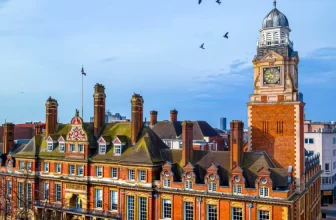
Study Guide UK
You’ve probably imagined it, walking through historic campuses, sipping tea on a rainy afternoon, hearing lectures in grand old halls, and debating ideas with students from around the world. That’s just one version of the story. The UK is so much more than Hogwarts castles and Shakespeare quotes.
Studying in the UK today means joining one of the world’s most intellectually diverse communities, with global universities, industry-leading research, and career pathways that can take you just about anywhere.
In this Study Guide UK, you’ll get everything you need: tips, facts, timelines, and answers, not as a pushy sales pitch, but as if your study abroad mentor sat down to walk you through it all over coffee.
Let’s get started.
Why Choose the UK for International Education?
Why do hundreds of thousands of students from every corner of the world come to the UK to study every year? Because it really does deliver on four major fronts:
- Reputation. UK universities consistently rank among the best globally, Oxford, Cambridge, Imperial, and LSE aren’t just famous names; they’re serious academic powerhouses.
- Employability. UK degrees are globally recognized by employers and universities. The UK’s focus on critical thinking, writing, and real-world case-based education makes its graduates stand out.
- Flexibility. Undergraduate degrees are often shorter (typically 3 years) and master’s degrees just 1 year, meaning you graduate (and start earning) faster.
- Culture & Connection. You’ll meet people from everywhere. The UK is incredibly international yet deeply rooted in its own historic traditions. It’s a beautiful blend.
And the best part? Whether you’re studying engineering in Manchester, medicine in Edinburgh, or media in London, there’s a program and place for every kind of student.
Top Universities in the UK
Here’s the truth: It’s not just about choosing a “top-ranked” school, it’s about finding the right fit. But to help you shortlist, here are some of the UK’s best, known not just for rankings but also for career impact and student experience.
🔹 1. University of Oxford
- QS World Ranking: #3 (2025)
- Timeless academic tradition blended with cutting-edge research.
- Hugely competitive – ideal for top academic performers across all fields.
🔹 2. University of Cambridge
- Internationally famous for STEM, humanities, and the arts.
- Known for rigorous interview processes and the tutorial (supervision) system.
- Offers world-class mentorship and research opportunities.
🔹 3. Imperial College London
- Engineering, medicine, and computer science, this is where future inventors thrive.
- Exceptional labs and links to the tech and healthcare sectors.
🔹 4. London School of Economics and Political Science (LSE)
- Renowned for economics, law, political science, and international relations.
- A favorite for future policymakers and global business leaders.
🔹 5. University of Edinburgh
- Welcoming for internationals, especially in medicine, AI, and humanities.
- Incredible location: historic, student-friendly, and intellectually rich.
✅ Bonus options: University of Manchester, University of Bristol, King’s College London, and University of Warwick, all offering excellent faculties and global student communities.
Most Popular Courses in the UK (and Why They Matter)
There’s no shortage of course options here, but these fields regularly top the charts among international students because of their quality, career scope, and innovation edge.
💻 Computer Science and AI
You’re in the birthplace of Alan Turing. UK universities are advancing research in artificial intelligence, quantum computing, and network security with global partners. It’s highly employable worldwide, and many programs offer industrial placements.
🏥 Medicine and Health Sciences
UK med schools rank among the top 10 globally. Studying medicine here (including programs like MBChB or MBBS) means rigorous training, a strong research foundation, and clear postgraduate routes for practice.
🔬 Engineering
Specialties like mechanical, aerospace, biomedical, and civil engineering see huge enrolment. Schools like Imperial, Bristol, and Sheffield have thriving industry partnerships and research labs.
📈 Business and Finance
From fintech and global trade to sustainability and innovation, the UK’s business programs (especially MBAs) have international credibility. Think networking with firms like Deloitte, Goldman Sachs, or even startups via accelerator links.
📚 Humanities and Literature
Want to walk the steps of Woolf, Orwell, or Shakespeare? The UK doesn’t just preserve culture, it questions and redefines it. Literature, language, philosophy, and history programs here are bold, forward-looking, and globally connected.
🧪 Data Science
This interdisciplinary superhero is powering everything, business decisions, healthcare predictions, climate modeling. Study in the UK and gain data-handling skills that are in-demand across the tech world.
Cost of Studying in the UK (Let’s Talk Numbers)
This is one of the big questions, right? So let’s break cost into clear pieces: tuition + living expenses.
🎓 Tuition Fees by Course Area
| Program Area | Annual Fees for International Students |
|---|---|
| Humanities & Social Sciences | £10,000 – £20,000 |
| Business / Economics | £12,000 – £25,000 |
| Engineering & Tech | £15,000 – £30,000+ |
| Medicine / Dentistry | £30,000 – £50,000+ |
| MBA Programs | £25,000 – £60,000 |
The exact fees depend on the university. Also, undergrad degrees are often shorter in the UK (3 years), which means savings overall.
💸 Living Costs (Monthly Breakdown Outside London)
| Expense | Monthly Cost (Approx.) |
|---|---|
| Accommodation | £400 – £800 |
| Food | £150 – £250 |
| Transport | £40 – £80 |
| Personal / Leisure | £100 – £200 |
| Utilities & Internet | £40 – £60 |
| Total | £750 – £1,400 |
📍 In London, budget closer to £1,300–£1,800/month. But most students outside the capital find affordable options without sacrificing city amenities.
Scholarships & Financial Aid Options
Feeling overwhelmed by the costs? Totally fair, but there’s hope. The UK offers generous, diverse, and merit-based scholarships, many of which international students regularly win.
✅ Top Scholarships You Should Know
- Chevening Scholarships
- Fully funded master’s scholarship for students with leadership potential
- Covers tuition, travel, and monthly stipend
- Commonwealth Scholarships
- For students from eligible Commonwealth countries
- Full tuition + allowances (usually for postgrad studies)
- GREAT Scholarships
- Funded by the UK government and partner universities
- Available in specific countries across a range of subjects
- University-specific Scholarships
- Examples: Rhodes (Oxford), Gates (Cambridge), Global Scholarships at UCL, and many more
🎯 Tip: Start researching early, applications often close a year before program start dates.
Career Prospects After Graduation
Studying in the UK isn’t just about academics. It’s a launchpad.
🇬🇧 Post-Study Work Visa (Graduate Route)
Introduced recently, the Graduate Route gives international students the right to stay and work in the UK for up to 2 years after graduation (3 years if you earn a PhD).
No job offer needed to apply, just proof you’ve completed your degree. That’s a serious door-opener.
🔥 High-Demand Sectors for Grads
- Tech & Software Engineering
- Healthcare & Allied Sciences
- Business & Finance
- Environmental Sciences & Sustainability
- Creative Design & Media
Employers increasingly collaborate with universities to recruit top-performing international talent. Careers fairs? Yes. Internship pipelines? Also yes.
Essential Documents for Admission
Ready to apply? Here’s what you’ll typically need.
📄 University Applications (UG + PG):
- Academic transcripts (translated into English if needed)
- Personal statement (SOP-style essay)
- English language proficiency (IELTS, TOEFL, or equivalent)
- Letters of Recommendation (LORs) – usually 2
- Resume/CV (for PG or MBA)
- Passport copy
- Portfolio (for design, art, or architecture courses)
UG students apply via UCAS, while PG students usually apply directly through university portals.
Student Visa Process for the UK: Step-by-Step Guide
Applying for your Student Route visa (formerly Tier 4) is manageable, just follow the flow.
✈️ Step-by-Step Process
- Get a CAS Letter
- Confirmed Acceptance for Studies provided by your university
- Prepare Documents:
- Valid passport
- CAS letter
- English language test scores
- Tuberculosis test (for some nationalities)
- Proof of funds: You must demonstrate you can pay 1 year’s tuition + living costs (£1,023/month or £1,334/month for London) for 9 months
- Apply Online via UK Visas & Immigration
- Pay visa fee (~£490)
- Pay Immigration Health Surcharge (~£470/year)
- Attend Biometrics Appointment
- Often booked through your local visa center
- Wait for Decision: 3–6 weeks (or faster with express options)
🎉 Once approved, you’ll get a visa vignette in your passport and a BRP (Biometric Residence Permit) to collect once you’re in the UK.
Conclusion – Your UK Study Journey Starts Here
This Study Guide UK has walked you through everything, what’s possible, how much it costs, how to apply, what you can expect after graduation, and more.
We’ve covered:
- Why the UK is a globally trusted study destination
- The best universities and most in-demand programs
- Scholarships, visa steps, and vibrant student life
But the real secret? Most students don’t feel “ready” when they hit apply, they just do it. And everything unfolds from there.
So, breathe. Bookmark this guide. And if your goal is to study in one of the world’s most dynamic education ecosystems, the UK is absolutely worth your bold leap.
FAQs – Top 10 Student Questions About Studying in the UK
1. Is IELTS required to study in the UK?
Yes, for most programs. Generally, a score of 6.0–7.0 is required. Some universities may also accept TOEFL or alternatives.
2. How much does it cost to study in the UK?
Tuition ranges from £10,000 to £50,000/year, depending on the course. Living costs average £750 to £1,400/month.
3. Can I work while studying?
Yes, international students can work up to 20 hours/week during term and full-time during holidays.
4. What is the Graduate Route visa?
It’s a post-study visa allowing graduates to stay in the UK for 2 years (or 3 for PhDs) to work or job-hunt.
5. Which universities are best for international students?
Top choices include Oxford, Cambridge, Imperial, UCL, LSE, and Edinburgh , but many others offer stellar academic + student experience.
6. When should I apply?
For undergrad: UCAS deadlines are usually January for Autumn intakes. For postgrad: varies, but apply 6–9 months in advance.
7. How do I apply to universities?
UG: Use UCAS. PG: Apply directly to the university.
8. Are scholarships available?
Absolutely, from Chevening to Commonwealth, GREAT scholarships, and university-specific funding.
9. Do I need health insurance?
Yes, you’ll pay the Immigration Health Surcharge, which gives you full access to the NHS during your stay.
10. Can I bring my family to the UK?
PG students in full-time courses can bring dependents. Check UKVI rules for latest updates.
📚 Ready to take the leap? The opportunities are vast, but the real magic begins when you say yes. Your UK study adventure might be just one application away.











